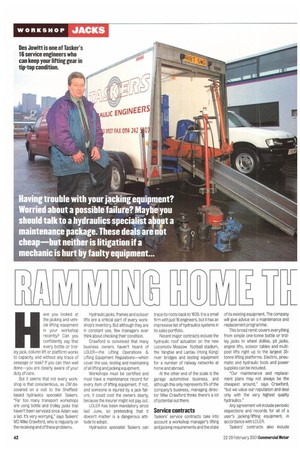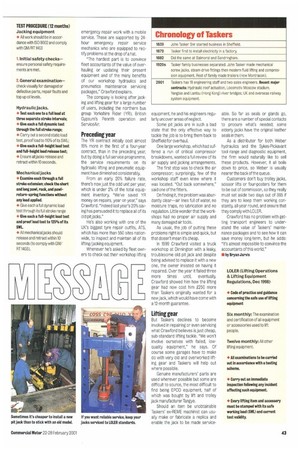Having trouble with your ja_clking equipment? Worried about a possible
Page 44

Page 45

If you've noticed an error in this article please click here to report it so we can fix it.
failure? Maybe you should talk to a hydraulics specialist ahlut a maintenance package. These deals are not cheap—but neither is litigation if a mechanic is hurt by faulty equipment...
Have you looked at the jacking and vehicle lifting equipment in your workshop recently? Can you confidently say that every bottle or trolley jack, column lift or platform works to capacity, and without any trace of seepage or leak? If you can then well done—you are clearly aware of your duty of care.
But it seems that not every workshop is that conscientious, as CM discovered on a visit to the Sheffieldbased hydraulics specialist Taskers. "Far too many transport workshops are using bottle and trolley jacks that haven't been serviced since Adam was a lad. It's very worrying," says Taskers' MD Mike Crawford, who is regularly on the receiving end of these problems.
Hydraulic jacks, frames and scissor lifts are a critical part of every workshop's inventory. But although they are in constant use, few managers ever think about checking their condition.
Crawford is convinced that many business owners haven't heard of LOLER—the Lifting Operations & Lifting Equipment Regulations—which cover the use, testing and maintaining of all lifting and jacking equipment.
Workshops must be certified and must have a maintenance record for every item of lifting equipment. If not, and someone is injured by a jack failure, it could cost the owners dearly, because the insurer might not pay out.
LOLER has been mandatory since last June, so pretending that it doesn't matter is a dangerous attitude to adopt.
Hydraulics specialist Taskers can trace its roots back to 1839it is a small firm with just 16 engineers, but it has an impressive list of hydraulics systems in its sales portfolio.
Recent major contracts include the hydraulic roof actuation on the new Locomotiv Moscow football stadium, the Yangtse and Lantau (Hong Kong) river bridges and testing equipment for a number of railway networks at home and abroad.
At the other end of the scale is the garage automotive business, and although this only represents 5% of the company's business, managing director Mike Crawford thinks there's a lot of potential out there.
Service contracts
lockers' service contracts take into account a workshop manager's lifting and jacking requirements and the state of its existing equipment. The company will give advice on a maintenance and replacement programme.
This broad remit covers everything from simple one-tonne bottle or trolley jacks to wheel dollies, pit jacks, engine lifts, scissor tables and multipost lifts right up to the largest 35tonne lifting platforms. Electric, pneumatic and hydraulic tools and power supplies can be Included.
"Our maintenance and replacement plans may not always be the cheapest around," says Crawford, but we value our reputation and deal only with the very highest quality hydraulics."
Any agreement will include periodic inspections and records for all of a user's jacking/lifting equipment, in accordance with LOLER.
Taskers' contracts also include emergency repair work with a mobile service. These are supported by 24hour emergency repair service mechanics who are equipped to rectify problems at the drop of a hat.
"The hardest part is to convince fleet accountants of the value of overhauling or updating their present equipment and of the many benefits of our workshop hydraulics and pneumatics maintenance servicing packages," Crawford explains.
The company is looking after jacking and lifting gear for a large number of users, including the northern bus group Yorkshire Rider (YR), British Gypsum's Penrith operation and ServiceAin
Preceding year
The YR contract initially cost almost 15% more in the first of a four-year contract, than in the preceding year, but by doing a full service programme, the service requirements on its hydraulic lifting and pneumatic equipment have diminished considerably.
From an early 20% failure rate, there's now just the odd unit per year, which is under 2% of the total equipment inventory. "We've saved YR money on repairs, year on year," says Crawford. "Indeed last year's 20% saving has persuaded it to replace all of its old pit jacks," He's also working with one of the UK's biggest tyre repair outfits, ATS, which has more than 550 sites nationwide, to inspect and maintain all of its lifting/jacking equipment.
Whenever he's asked by fleet owners to check out their workshop lifting equipment, he and his engineers regularly uncover areas of neglect.
Some pit jacks are in such a bad state that the only effective way to tackle the job is to bring them back to Sheffield for overhaul.
One large workshop, which had suffered a run of critical compressor breakdowns, wanted a full review of its air supply and jacking arrangements.
The first stop was to check the air compressor; surprisingly, few of the workshop staff even knew where it was located. "Out back somewhere," said one of the fitters.
On finding it, the problem was abundantly clear—air lines full of water, no moisture traps, no lubrication and no regulation. Little wonder that the workshops had no proper air supply and many damaged air tools.
As usual, the job of putting these problems right is simple and quick, but that doesn't mean it's cheap.
In 1999 Crawford visited a truck workshop at Dinnington with a leaky, troublesome old pit jack and despite being advised to replace it with a new one, the owner insisted on having it repaired. Over the year it failed three more times until, eventually, Crawford showed him how the lifting gear had now cost him £250 more than Taskers originally wanted for a new jack, which would have come with a 12-month guarantee.
Lifting gear
But Taskers declines to become involved in repairing or even servicing what Crawford believes is just cheap, sub-standard lifting tackle. "We won't involve ourselves with failed, lowquality equipment," he says. Of course some garages have to make do with very old and overworked lifting gear and Taskers will help out where possible.
Genuine manufacturers' parts are used wherever possible but some are difficult to source, the most difficult to find being EIRCO equipment, half of which was bought by lift and trolley jack manufacturer Tangye.
Should an item be unobtainable Taskers' ex-REME machinist can usually make or fabricate a replica and enable the jack to be made service able. So far as seals or glands go, there are a number of special contacts to procure what's needed; some elderly jacks have the original leather seals in them.
As a distributor for both Weber hydraulics and the Sykes-Pickavant tool range and diagnostic equipment, the firm would naturally like to sell these products. However, it all boils down to price, so Weber is usually nearer the back of the queue.
Customers don't buy trolley jacks, scissor lifts or four-posters for them to be out of commission, so they really must set aside two days out of 365 if they are to keep them working constantly, all-year round, and ensure that they comply with LOLER.
Crawford has no problem with getting transport engineers to understand the value of Taskers' maintenance packages and to see how it can save money long-term, but he adds: "It's almost impossible to convince the accountants of this world."
• by Bryan Jarvis




































































































